May 16, 2025 | 09:47 GMT +7
May 16, 2025 | 09:47 GMT +7
Hotline: 0913.378.918
May 16, 2025 | 09:47 GMT +7
Hotline: 0913.378.918
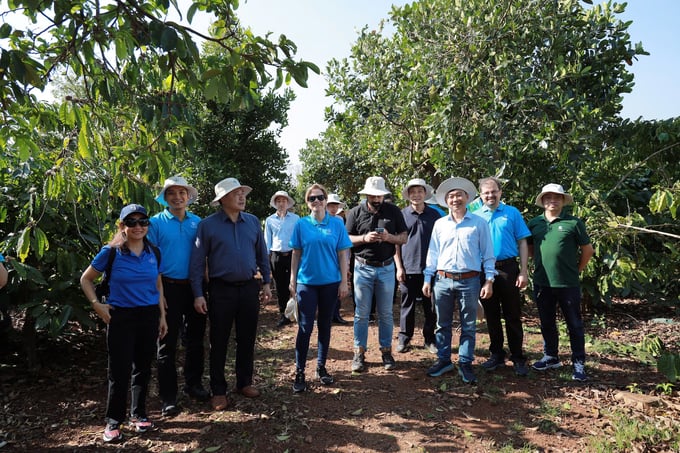
The delegation visited Mr. Nguyen An Son's coffee garden in village 6, Ea Kpam commune, Cu M'gar district, Dak Lak. Photo: Thanh Huyen.
A working delegation from Bayer Group, along with leaders from the National Extension Center and the Institute of Science and Technology for Agriculture and Forestry of the Central Highlands, recently visited Mr. Nguyen An Son's coffee garden in Village 6, Ea Kpam Commune, Cu M'gar District, Dak Lak Province.
Bayer Group and its partners have chosen this garden as a model site for the Better Life Farming Project – Pioneering Agriculture, Prosperous Farmers (BLF) in 2025. In October 2024, the project was launched with an aim to assist durian and coffee smallholder farmers in the Central Highlands.
The ForwardFarming model is currently being implemented in the rice fields of Mr. Do Tri Hung's family in Dong Thuan Commune, Thoi Lai District, Can Tho City. Bayer, in collaboration with the National Agricultural Extension Center, the Mekong Delta Rice Institute, Binh Dien Fertilizer Joint Stock Company, and Saigon Kim Hong Company, conducted field surveys in the Mekong Delta.
These initatives aims to encourage the implementation of sustainable agricultural models in the two primary agricultural production regions of the nation. The ForwardFarming initiative has been operational since September 2023.
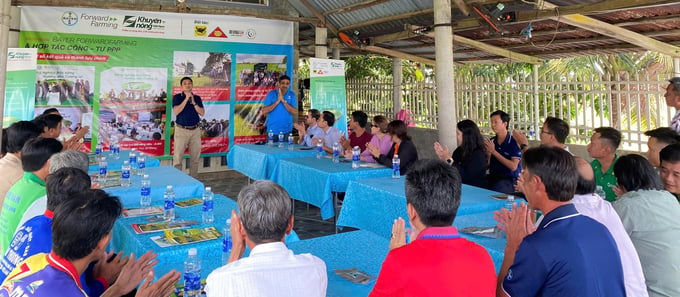
Bayer and partners conducted a field survey at the ForwardFarming model in Dong Thuan commune, Thoi Lai district, Can Tho city in early February. Photo: Thanh Huyen.
Both initiatives assist farmers in gaining access to advanced solutions and technical advice, which can assist improving farming efficacy and developing their capacity to become effective agricultural producers. Bayer promotes the adoption of contemporary cultivation methods and the exchange of experiences among farmers in order to enhance productivity, mitigate environmental impact, reduce greenhouse gas emissions, and conserve natural resources.
The Better Life Farming and ForwardFarming programs' accomplishments in 2024 are of immense importance in the context of stringent export market demands and complex climate change. This establishes a critical foundation, enabling Bayer Vietnam, the National Agricultural Extension Center, value chain partners, and local producers to continue the implementation of sustainable agriculture solutions.
In comparison to the winter-spring crop, producers encounter greater pest pressures during the summer-autumn rice season with ForwardFarming, as the growth and development of rice plants are adversely affected by heavy rains. The ForwardFarming model has partially mitigated these challenges by integrating sophisticated technologies and solutions.
The ForwardFarming solution package can help reduce seed usage by 50% and nitrogen fertilizer usage by 30 to 50%, while simultaneously increasing yields by 13.5% and profits by 13.1% to 54.9%, depending on the season, according to survey and evaluation results from 2024. In five cropping seasons, the harvested products have complied with EU food safety standards in terms of pesticide residues. The Cuu Long Rice Research Institute's assessment indicates that the solution bundle has the potential to reduce greenhouse gas emissions by up to 24.7% and conserve 50% of water.
Bayer Vietnam and its value chain partners have conducted nearly 100 training sessions within the project's scope to exchange expertise, thereby allowing 4,500 farmers to access advanced agricultural knowledge and solutions.
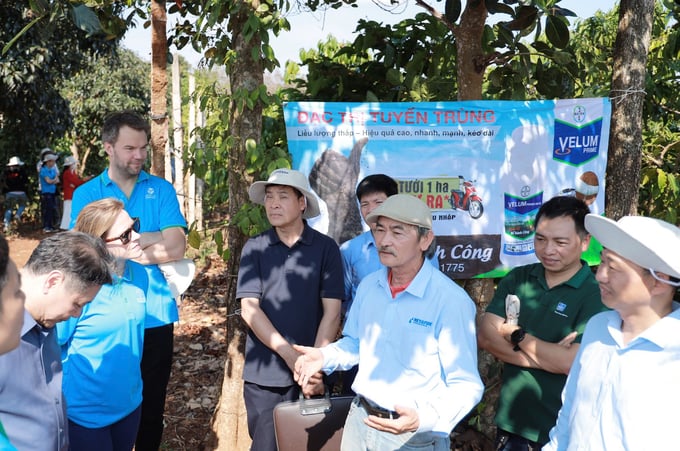
Mr. Nguyen An Son (middle) shares about applying farming solutions from the Better Life Farming Project. Photo: Thanh Huyen.
The Better Life Farming initiative has already achieved significant accomplishments by providing targeted support to farmers who cultivate durian and coffee, despite its recent launch. Over the past year, an assessment of two model durian plantations in Dak Nong demonstrated that Bayer's integrated crop protection solutions were instrumental in reducing pest infestations by 80 to 90%, increasing yields by 20%, and guaranteeing that the products met export standards.
In addition, the project has established Better Life Farming agricultural service centers, which are managed by local enterprises. These centers serve as hubs that provide farmers with comprehensive agricultural solutions, including technical advice, market information, and knowledge. The ultimate objective is to connect farmers with the agricultural value chain.
Climate change is having an increasingly adverse effect on coffee cultivation, according to Mr. Nguyen An Son, proprietor of a coffee plantation in Dak Lak. For example, the 2024 harvest saw a decrease in coffee yields, despite the presence of an adequate water supply, due to severe drought conditions and early-season insect infestations.
Mr. Son stated that his garden utilizes a drip irrigation system that conserves water, as well as the scientific application of plant protection products that are not influenced by weather conditions, timely fertilizer application, and the utilization of plant protection products. Consequently, the garden achieves greater efficiency, minimizes environmental runoff, and reduces wastage. With these achievements, he anticipates that the yield in the 2025 season will increase by 1.5 times that of the previous year.
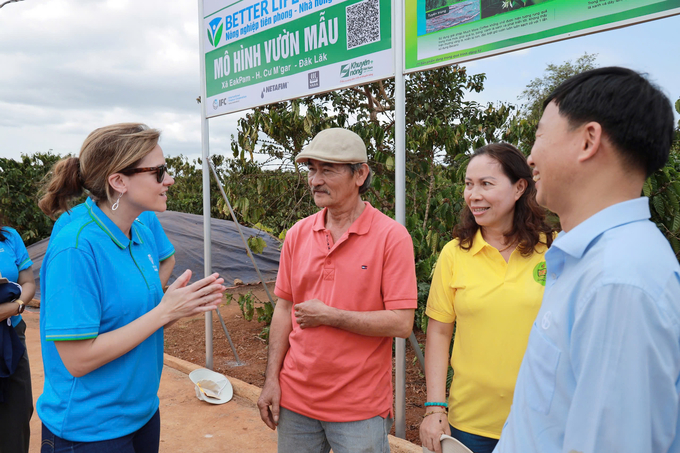
Ms. Natasha Santos - Director of Global Sustainability Strategy, Bayer Group (left) shares her feelings when visiting the model of the Better Life Farming project. Photo: Thanh Huyen.
Ms. Natasha Santos, Global Sustainability Strategy Director of Bayer Group, stated, "Our global goal is to facilitate the transition to regenerative agriculture by implementing sustainable farming solutions that effectively mitigate climate change, safeguard and conserve resources, and simultaneously improve the quality of life and incomes."
To provide the most suitable solutions to the obstacles that local farmers encounter, we endeavor to comprehend and investigate the distinctive agricultural conditions and practices of each region. She also emphasized the importance of public-private partnerships in the implementation of sustainable agriculture initiatives in Vietnam.
The collaboration between private companies like Bayer Vietnam and public institutions such as the National Extension Center, the Institute of Science and Technology for Agriculture and Forestry of the Central Highlands (WASI), and the Mekong Delta Rice Institute, in addition to contributions from value chain partners, generates substantial strength.
Translated by Linh Linh

(VAN) Vietnam’s TH Group officially put its high-tech fresh milk processing plant into operation in the Russian Federation, marking a historic moment as the first TH true MILK cartons were produced in Russia.

(VAN) Use of high-quality broodstock and biotechnology is regarded as the most effective approach to ensuring sustainable and economically viable shrimp aquaculture ahead of climate change and the emergence of increasingly intricate disease patterns.

(VAN) Carbon farming is a form of agricultural practices that helps absorb more greenhouse gases than it emits, through smart management of soil, crops, and livestock.

(VAN) This is a key content of the Memorandum of Understanding recently signed between the Vietnam Fisheries Society and Kunihiro Inc of Japan.

(VAN) To achieve the goal, local authorities and businesses in Kon Tum province have fully prepared the necessary conditions for the new Ngoc Linh ginseng planting season.
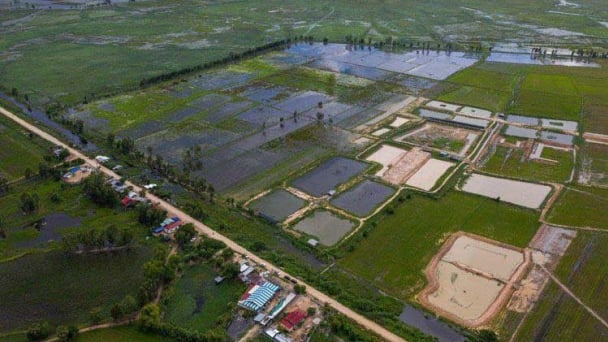
(VAN) Jiangsu province is gearing up to host training programs in Phnom Penh, the capital of Cambodia, this year to establish the Fish and Rice Corridor.
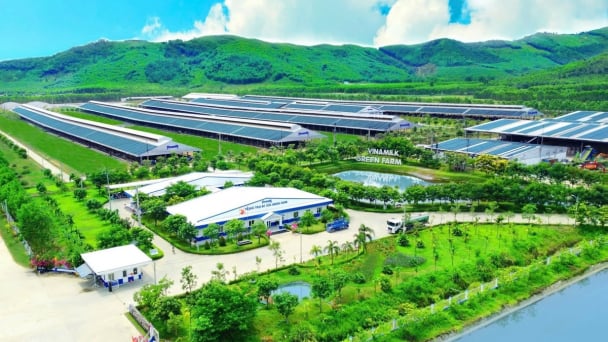
(VAN) Le Hoang Minh, representing Vinamilk, shared the company's experience in energy saving and green energy transition for production at a workshop held during the P4G Summit.